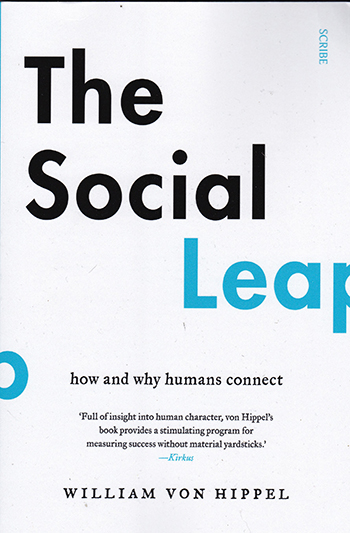The Social Leap
How and Why Humans Connect
William von Hippel
Scribe 304pp $29.99
A myriad of books discuss who and what we are, and why we behave the way we do. From Darwin to Dawkins, human genetics and behaviours have gone under the microscope, and it is hard to imagine what mysteries remain to be uncovered, apart from the causes and possible cures of many illnesses.
Yet William von Hippel has compiled a highly original and enjoyable account of human evolution and its inextricable relationship with our psychology.
Professor von Hippel grew up, studied and taught in the US before “finding his way” to Australia, as his bio puts, and later becoming a professor of psychology at the University of Queensland. Extensively published in the mainstream and academic press, this is his first full-length book, and a cracker it is, although hardly the “rollicking tour through humanity’s evolutionary past” that one reviewer suggested, if for no other reason than a good deal of it is set in the present.
“We tend to think of evolution in terms of anatomy, but attitudes are just as important for survival as body parts,” he writes.
“Preferences that don’t fit your abilities are as debilitating as limbs that don’t suit your lifestyle… our bodies changed a little over the last six or seven million years, but our psychology changed a lot.”
How this affects matters as diverse as world peace and the relationship between our happiness and our health, he discusses in riveting fashion, crafting a narrative that holds equal appeal for both general and specialist readers, not to mention corporate chiefs whose competitive behaviour is entertainingly, and accurately, compared to African baboons.
“Baboon leaders are particularly motivated by the enormous status, power and financial reward of being a CEO”, he writes, juxtaposing the animal and its human counterpart with elephants and the rest of us whose characteristic behaviours are largely collaborative.
“Once we moved to the savannah and found that cooperation was the key to success, we had the good fortune that group goals and individual goals aligned for the first time in the great apes… [this] eventually brought us to the top of the food chain, despite the conspicuous absence of any biological weaponry beyond our large brain.”
Hence, the great “social leap” and our exit from Africa.
“It was our capacity to learn from the experiences of others that gave Homo sapiens an enormous local advantage… each generation had no need to reinvent the wheel.”
The book enters fascinating territory when von Hippel considers the psychology behind technical innovation, pondering why some people innovate new products while most people don’t, and exploring what he terms the “social innovation hypothesis”.
Based on extensive studies, he suggests that while almost all humans are innovators, people with a more social disposition direct their inventive capacities towards socialising rather than invention. Further, “Professions oriented towards technical solutions (e.g. mathematics and engineering) boast many more people in their ranks who are not only on the autism spectrum but are predominantly male.”
Apple’s Steve Jobs comes to mind.
Equally intriguing is his exploration of how humans evolved to cooperate within but not between groups, citing how “our ancestors also faced the risk that other groups had been exposed to different pathogens, and thus could potentially give them new diseases… so we developed psychological adaptations to disease threats that are collectively characterised as the behavioural immune system…
“People who found other people’s open sores interesting or attractive were far less likely to survive and have children of their own, and thus evolution ensured that our disgust protects us… by regarding behaviours different from our own as wrong or immoral, we tend to stay away from people who engage in those behaviours, which protects us from them.”
Similarly protective, if internally based, is the close relationship between personal happiness – a quality not dependent on our material purchases, as he stresses – and our immune functioning:
“Our immune system evolved to hum along at peak capacity when we’re happy but to slow down dramatically when we’re not. This is why long-term unhappiness can literally kill you through its immune-suppressing effects, and why loneliness in late adulthood is deadlier than smoking.”
A study of older people showed that they remembered positive images (baskets of puppies) much better than negative ones (plane crash scenes), and this memory focus was closely linked with higher CD4 white blood cell counts, which indicates a greater preparedness to fight off disease: “In other words, the more positive their memories were today, the healthie they were next year and the year after… by focusing on the positive aspects of life, we enhance our own immune functioning.”
This is one of his ‘ten easy steps’ for a better life. Others include living in the present, cooperating with family, friends and colleagues, learning new things, accumulating “experiences not stuff”, and prioritising food, friends and sexual relationships.
Sounds a good recipe for continuing our social leap forward.
















